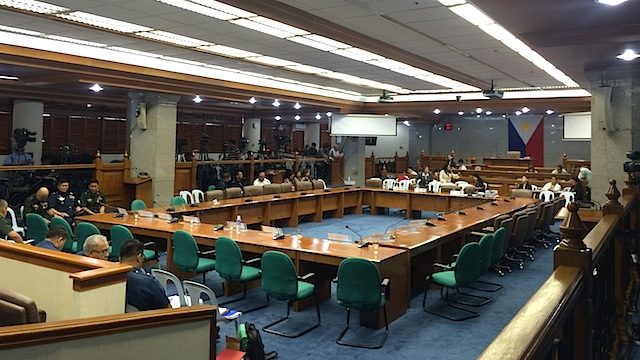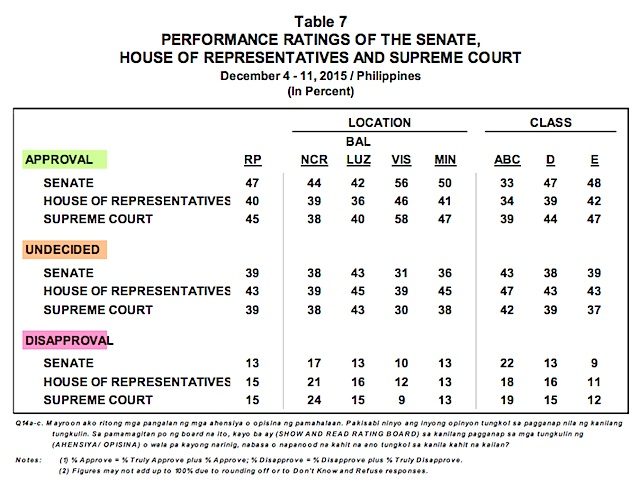SUMMARY
This is AI generated summarization, which may have errors. For context, always refer to the full article.

MANILA, Philippines – Among the 3 key government institutions in the country, Filipinos are most appreciative of the work of the Senate, according to the results of a survey conducted by Pulse Asia Research Incorporated.
Pulse Asia released the results of its December 2015 Ulat ng Bayan Survey on the performance and trust ratings of the top 5 officials of the Philippine government, and the performance ratings of key government institutions on Wednesday, January 6. (READ: Aquino tops, Binay bounces back in Pulse Asia poll)
Pulse Asia president Ronald Holmes noted that none of the key institutions – the Senate, the House of Representatives, and the Supreme Court – obtained big plurality to near majority approval among Filipinos in the nationwide survey conducted from December 4 to 11, 2015.
The survey results showed that public approval for the Senate rose to 47% in December from 44% in September, while disapproval dipped to 13%, from 19%.
The High Court obtained a public approval rating of 45%, a 4-percentage point drop from its rating in September.
Public approval is lowest for the House at 40%, a 1-percentage point improvement over its September rating.
“These institutions record almost the same disapproval figures (13% to 15%). During the period September to December 2015, the only notable movements in these institutions’ ratings are the increase in the indecision rating of the Supreme Court (+6 percentage points) and the drop in the Senate’s disapproval score (-6 percentage points),” Holmes said.
He said that the Senate obtained a majority approval rating in the Visayas (56%), and near majority approval figures in Mindanao (50%) and Classes D (47%) and E (48%).
“Practically the same approval and indecision scores are posted by the Senate in Metro Manila (44% and 38%, respectively), the rest of Luzon (42% and 43%, respectively), and Class ABC (33% and 43%, respectively),” Holmes added.
Metro Manila ratings
Among geographical locations, the Senate and the House of Representatives enjoyed the biggest improvement in their approval and disapproval ratings in Metro Manila.
Among Metro Manilans, approval of the Senate’s performance improved by 11 percentage points or to 44% in December from 33% in September. The Senate’s disapproval rating in the National Capital Region also decreased by 11 percentage points during the period, or to 17% from 28%.
In NCR, public approval for the House’s performance increased by 7 percentage points to 39% from 32%, while public disapproval ebbed to 21% from 27%.

“Virtually or exactly the same percentages of those in Metro Manila (both at 39%), the Visayas (46% and 39%, respectively), Mindanao (41% and 45%, respectively), and all socio-economic classes (34 to 42% and 43% to 47%, respectively) express either approval for or indecision concerning the work done by the House of Representatives,” Holmes said.
He added that “in the rest of Luzon, the plurality opinion is one of ambivalence on the matter of approving or disapproving the legislative chamber’s performance (45%).”
The Supreme Court obtained a majority approval rating in the Visayas (58%) in December, and near majority approval score in the poorest Class E (47%).
“In the other geographic areas and socio-economic classes, the High Court posts almost the same approval and indecision figures (38% to 47% and 38% to 43%, respectively),” Holmes said.
In the weeks leading to the survey, and during the survey period, the dominant issues included the filing of certificates of candidacy (COCs) of aspirants in the 2016 elections, the Senate Electoral Tribunal decision favoring Senator Grace Poe‘s assertion that she is a natural-born Filipino, and the Commission on Election (Comelec) divisions favoring the cancellation of Poe’s COC.
The other major issues were the dismissal of Makati Mayor Jejomar Erwin “Junjun” Binay Jr over the alleged overpricing of the Makati City Hall Building II, the Philippines’ hosting of the Asia-Pacific Economic Cooperation (APEC) Summit, the guilty verdict on US Marine Lance Corporal Joseph Scott Pemberton in connection with the death of Filipino transgender Jennifer Laude, the commemoration of the second anniversary of Super Typhoon Yolanda (Haiyan), and the Paris climate change talks.
During the period, the Philippines concluded its arguments before the Permanent Court of Arbitration in The Hague, Netherlands, on its case against China.
The survey was conducted among 1,800 registered voters 18 years old and above.
The nationwide survey has a 2% error margin at the 95% confidence level. Subnational estimates for the geographic areas covered in the survey have the following error margins at 95% confidence level: 6% for Metro Manila, 3% for the rest of Luzon and 5% for each of Visayas and Mindanao. – Rappler.com
Add a comment
How does this make you feel?
There are no comments yet. Add your comment to start the conversation.